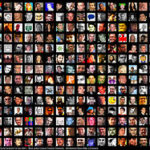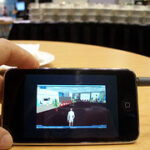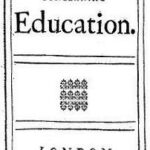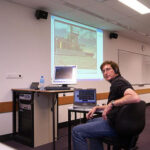Teaching On the Second Life Stage:
Playful Educational Strategies for Serious Purposes

CDB Barkley, Anya Ixchel and Kim Pasternak discuss the drama.
Yesterday, Anya Ixchel (Angela Thomas) and Kim Pasternak (me) presented our session at the New Media Consortium’s Symposium on Creativity in Second Life. We used aspects of Process Drama to develop a structure that can be used to explore issues and concerns through roleplay in the virtual world. The basic premise was that we located the story in the future – 2009. This was a time 2 years after several changes had been made to the governance of Second Life communities. Many existing (2007 reality) freedoms in Second Life were restricted or outlawed in the fictional future.
Participants were offered this letter as a pretext to the drama:
Open Letter to Linden Lab Staff
February 20, 2009
We, the undersigned, are concerned about way Second Life has moved away from its grassroots principles of freedom of
expression and participatory culture into a sanitized Disneyland state. We recall in 2004 when Phillip Linden proudly, enthusiastically and energetically espoused his philosophical stance about Second Life:
“So SL poses a new question… what if the online environment offered you MORE freedoms than the real world, in just about every
way. I assert … that we might therefore actually behave better in such a place. We might learn faster, interact more deeply, and therefore become better people, at least on some levels. Little has been written about this. I am asserting that this will only occur in an environment in which the freedoms are not a laundry list of experiences, a-la-Disneyland, but instead a fundamental ability to express yourself; these are the real freedoms. I am saying that if you have more freedoms, in an expressive sense, you might have better or at least more complex behaviour.” (Philip Linden, Second Life Herald Interview, June 21, 2004)
Indeed, during the first three to four years of Second Life, citizenship grew to several million users precisely because of the liberties and creativities found in such an “infinite possibilities” standpoint. People entered Second Life for a multiplicity of purposes, and its success today is directly related to the opportunities provided by user created content. Collaborative creativity on a global scale was never so exciting and exhilarating, and you might even recall that in 2007, the ground-breaking educational innovators at the New Media Consortium held a symposium on creativity in Second Life.
Yet since early 2007, there has been a steady decline in the freedoms enjoyed by and afforded to our citizens. First of all, advertising and signage related to certain sexual practices was outlawed. Soon thereafter, all casinos and houses of gambling were removed. In early 2008, there was crackdown on all explicit sexual practices – the furry avatar was removed as an option at log-in, and all Gorean sims were shut down. By the end of 2008, all known sims and clubs that offered simulated sexual practices were
removed without warning.
But by far we, the undersigned, believe that the most debilitating move on Linden Lab’s part is the new TOS policy issued in January of this year, 2009, to remove all M rated sims and M rated content, even in citizen’s private homes. With 30 million users, all over 18 and adult, we cannot understand this move to reduce Second Life to Disneyland, which serves only to stifle the creativity and personal freedom of expression out of each and very one of us. Second Life is no longer a deeply compelling place for us to live, to work, and to do our business. We therefore call for an immediate return to the terms of service as set out at the beginning of 2007.
(NOTE: THIS LETTER IS FICTIONAL AND DESIGNED FOR ROLE-PLAYING PURPOSES)
The material requirements for the drama were quite simple –Angela has some good pictures on her discussion of the event and JoKay Wollongong also. We used a mock up TV studio, a couple of sofas, a changeable backdrop screen (with international locations), a poster and a collection of role badges to help identify the general roles played by participants, and a Polling station.
We introduced the pretext material, randomly distributed role badges (Parent, Student, Admin, Teacher) and asked participants to group in their roles. Each group was asked to determine a representative who would appear on a TV debate. I played the TV host and Anya Ixchel was our roving “vox pop” reporter. The title of the debate on the TV was “Disneyland or Jurassic Park: What kind of Second Life do YOU want?”
The entire drama came and went very quickly – our 50 minute session was barely long enough to contain the interest and buzz that developed. Initial feedback after the session indicated that participants found the process engaging and effective.
Some nice photos from the event can be seen here.





